Closing Opportunity Gaps in the Digital World
Published on October 24, 2023 in Technology
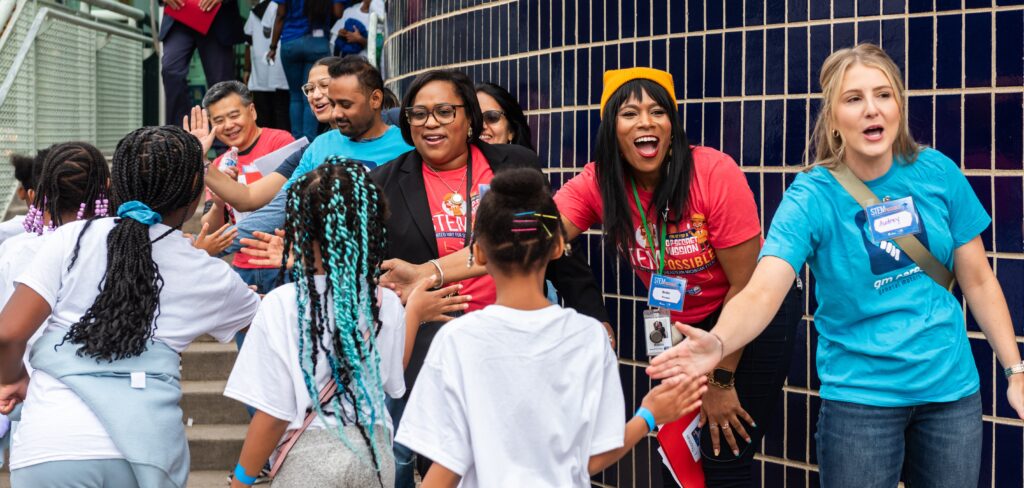
Surrounded by Lego towers standing twice his height, Preston added a few more colorful blocks before stepping back to admire his work. The fifth grader from Stevenson Elementary School built his towers during United Way for Southeastern Michigan’s STEMpossible event at the Michigan Science Center.
“I’m building Batman’s cave, but it’s rainbow so nobody even knows he is living there,” Preston said, gleefully humming a building tune made up by his trio of friends. “I like building stuff and doing stuff, and not just sitting and being bored for hours.”
Joining nearly 700 other fourth- and fifth-grade students from United Way Community Schools in Pontiac, River Rouge, Southfield and Hazel Park, Preston was anything but bored. At STEMpossible, the students rotated through interactive STEM stations intended to boost curiosity, encourage creativity, improve social skills and sharpen critical thinking.
“When I grow up, I want to be a builder or a racecar driver,” Preston said. “And I’m going to make an actual house that you can live in out of Legos. I would use real bricks that click together.”
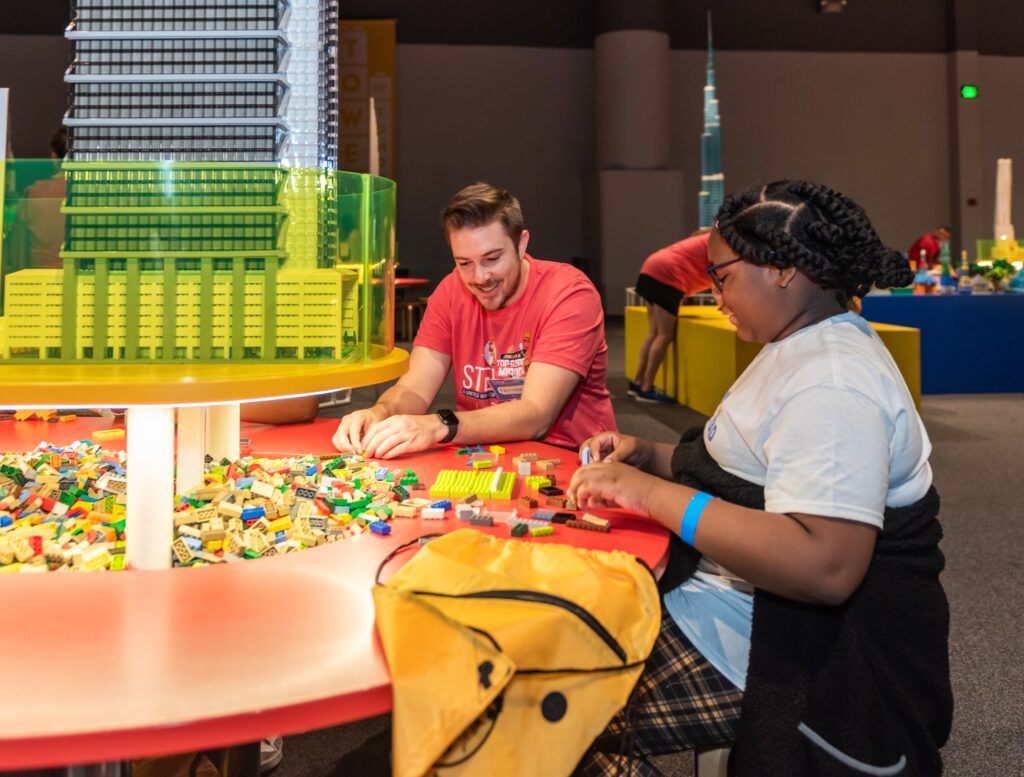
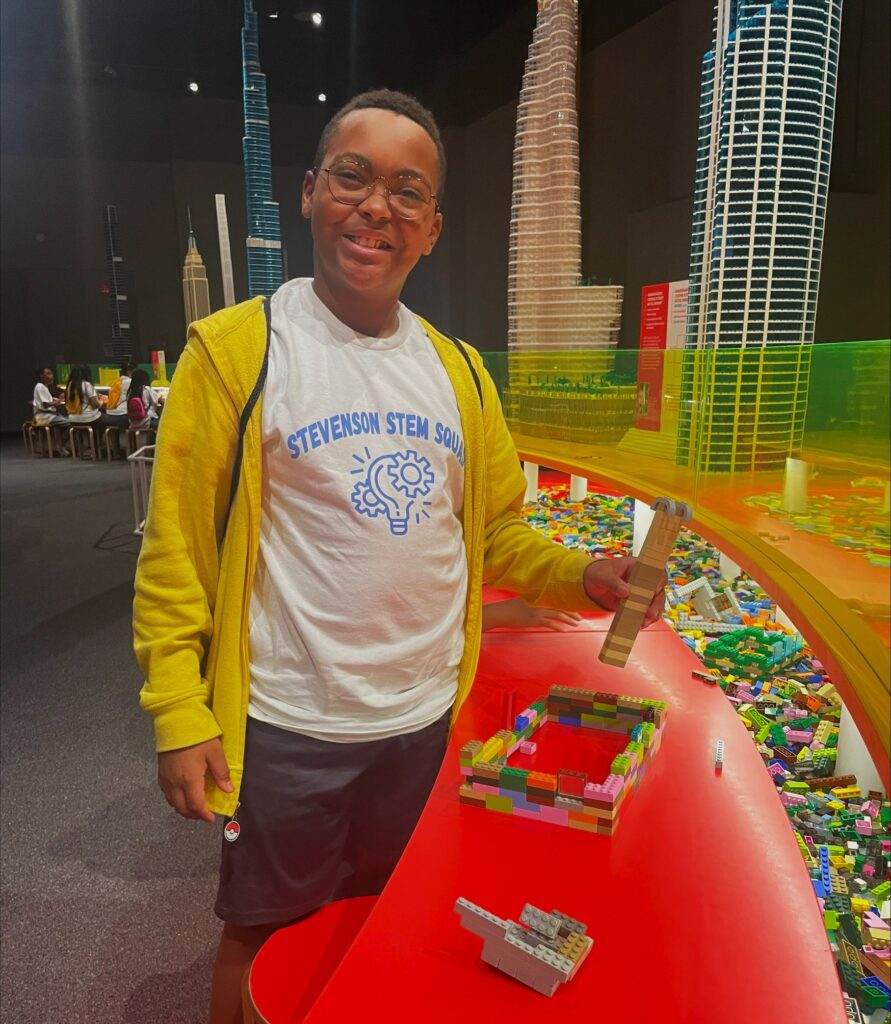
United Way is committed to helping children like Preston thrive in their early years and beyond. Tech United is a dedicated group of chief information officers and IT professionals committed to closing the digital divide. Along with bringing students to the Michigan Science Center, Tech United has raised more than $246,000 to support technology access and distributed 446 Dell Chromebooks to River Rouge, Southfield and Hazel Park students.
“We launched Tech United just two years ago to begin to stretch our imaginations and eliminate the limitations around what’s possible for the future of students across Southeastern Michigan,” said Tonya Adair, chief development, diversity and engagement officer at United Way for Southeastern Michigan. “That’s what Tech United is about – breaking down barriers and leveling the playing field.
“This group is a powerful example of what’s possible when nonprofits and philanthropists come together with corporations to solve a community issue.”
This work’s success would not be possible without our sponsors. Systems Technology Group (STG) was the presenting sponsor of the STEMpossible event. Many partner organizations used booths to showcase successful pathways in STEM careers: Accelerate4Kids, Ally Bank, Blue Cross Blue Shield, Code313, Comerica, General Motors, Lawrence Technological University, Lightning Robotics, Rocket Mortgage, Stellantis, STG, and University of Detroit Mercy. Other sponsors included Alfa, Amazon, CDW, Forum Systems, HCLTech, Infosys, Kyndryl, LTIMindtree, Strategic Staffing Solutions, Synergy Computer Solutions Inc., V2Soft Inc. and w3r Consulting.
THE DIGITAL WORLD REMAINS DIVIDED
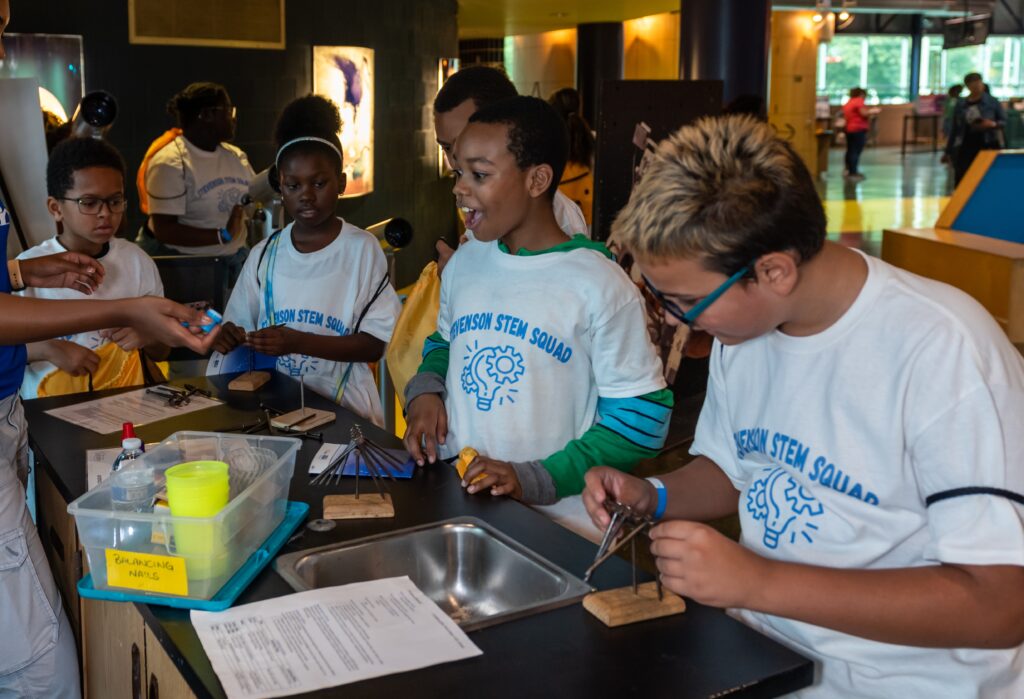
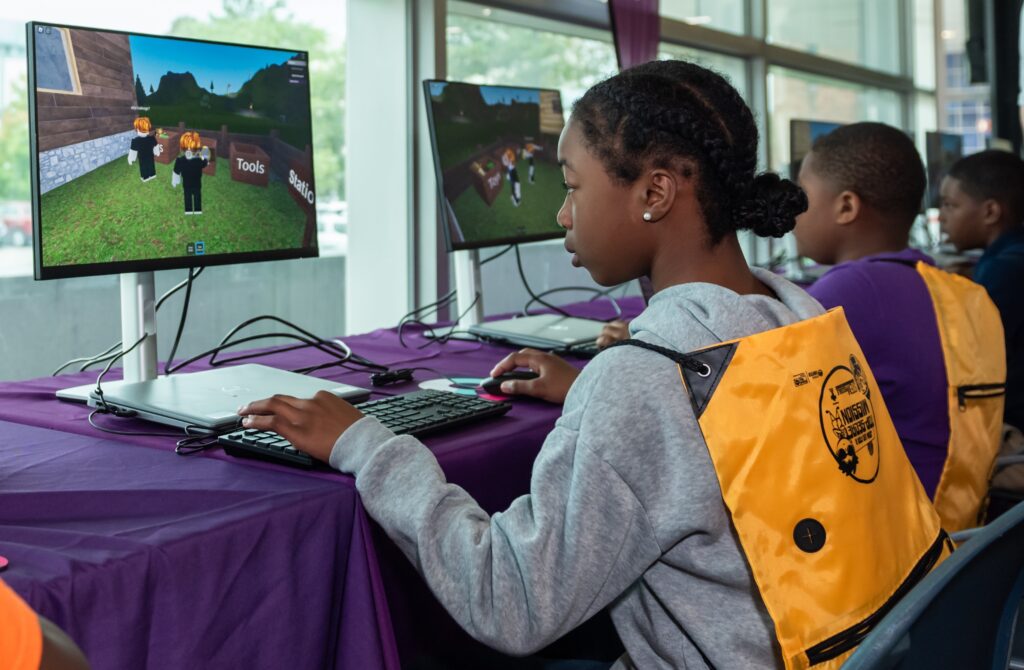
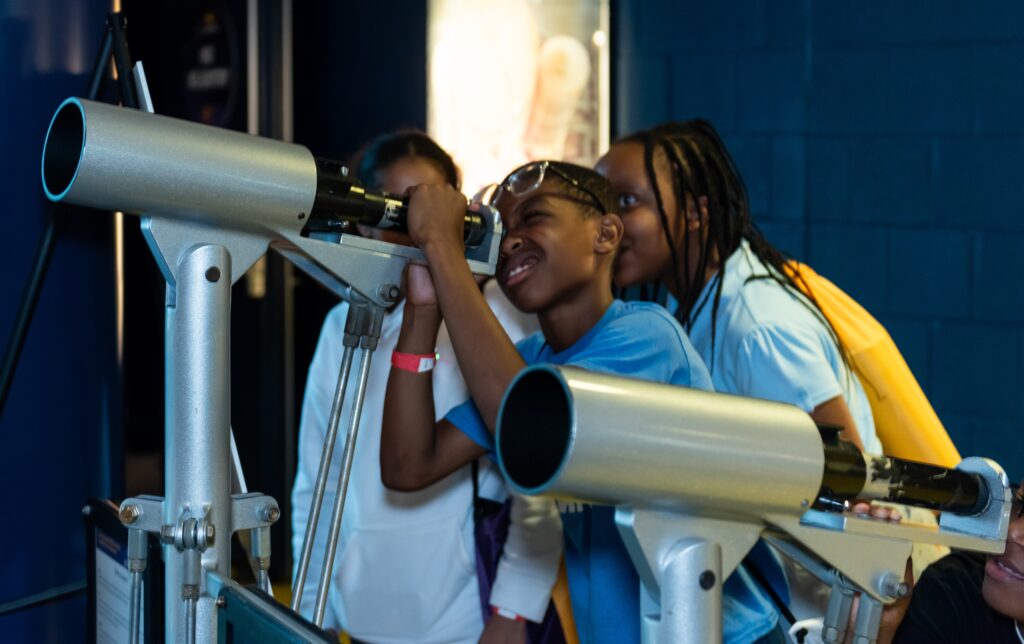
The MiSTEM Advisory Council reports that 76% of adults agree that STEM education is the best path to high-paying jobs for young Michiganders. However, 36% of parents report that their children do not participate in any STEM learning. Children without STEM opportunities are more likely to live in homes earning under $35,000 annually.
“STEM Education is the best pathway to high-paying jobs. A digital economy needs digital jobs,” said Anup Popat, CEO of STG and Tech United chair. “We want to inspire K-12 minds to think creatively, and innovatively and to pursue problem-solving related careers.
“I feel we have so much work to do, starting with all of us working together to ensure that each K-12 student has the same STEM educational opportunities as everyone else.”
Technology and internet, which at one time could be considered luxuries, are now basic needs. According to the 2023 ALICE (Asset Limited, Income Constrained, Employed) Report, a family of four spends $110 monthly on technology and internet access. Many ALICE families do not have the resources to connect themselves or their children to the digital world, though, widening the opportunity gap for those without proper access to technology.
Tech United aims to provide students that reside within ALICE communities equitable access to technology, along with hands-on STEM learning tools and fun opportunities outside of the classroom.
“Kids are STEM-starved,” said Dr. Shelia Williamson, DNP, CRNA and clinical instructor at University of Detroit Mercy at the STEMpossible event. “This is about introducing the kids to various career choices, opening up opportunities and really being a mentor or inspiration.
“Especially for African American students to see people that look like them and be emboldened to try something outside of the box. It’s about building confidence, and confidence builds competence.”
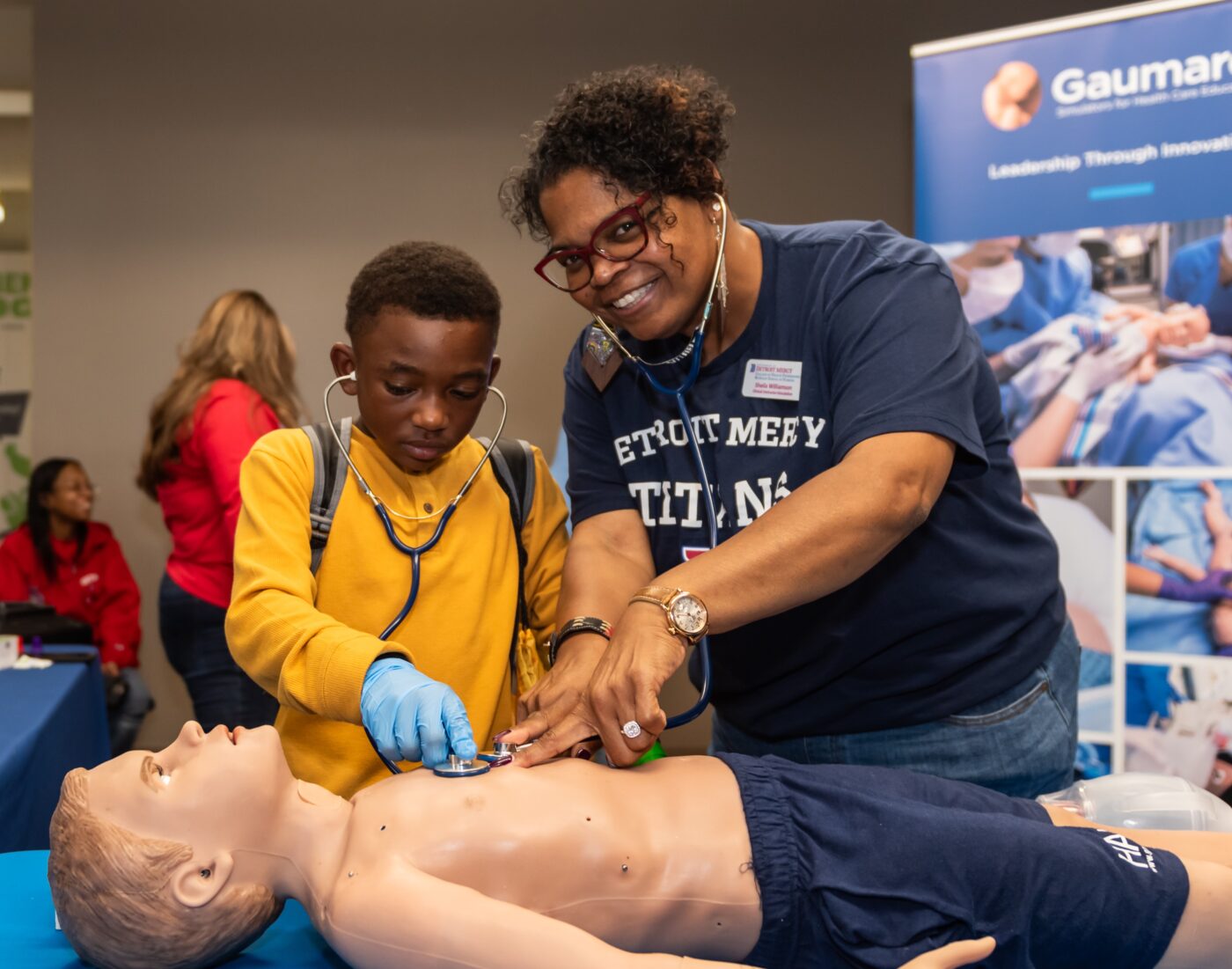
It’s about building confidence, and confidence builds competence.
— Dr. Shelia Williamson, DNP, CRNA
BUILDING STRONG FOUNDATIONS IN STEM
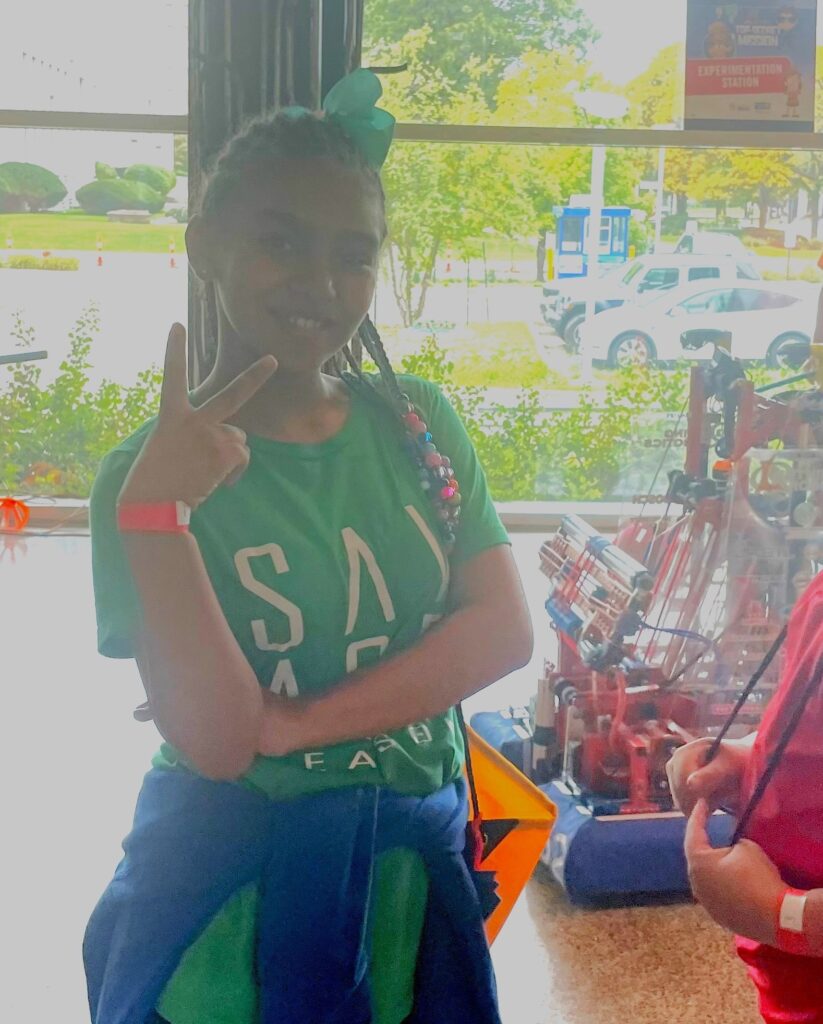
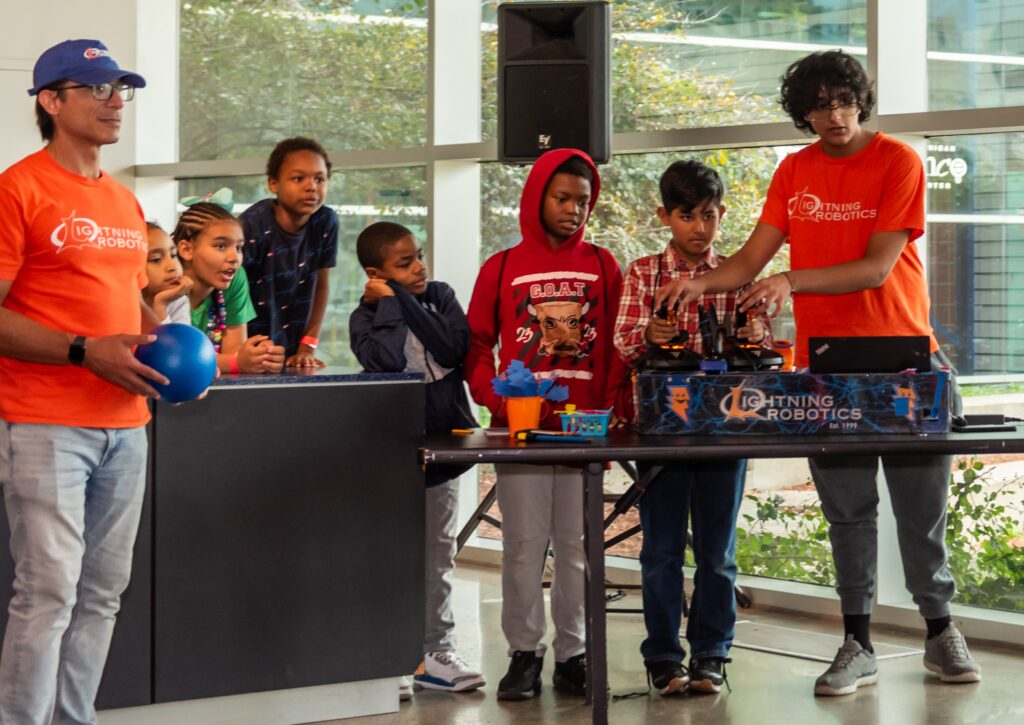
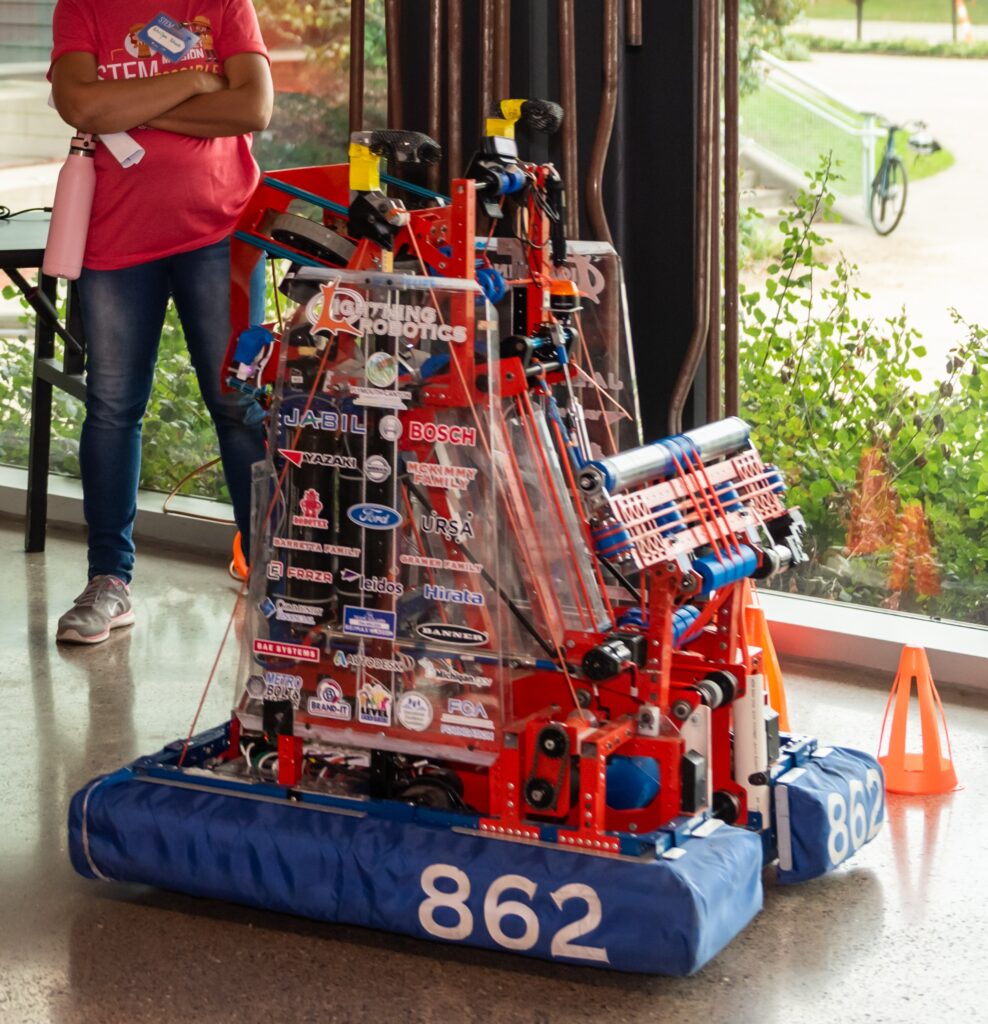
For many students, the STEMpossible event marked their first time visiting the Michigan Science Center. The opportunity to interact, experiment and investigate left students with a foundational excitement about what can be accomplished through STEM.
Included among those first-time visitors was Ceanna, a fourth grader from Ann Visger Elementary School. At the Lightning Robotics Team 862 station, Ceanna experienced a pseudo soccer game—between two robots taller than most students. She learned to use the controls and left the game beaming with pride.
“The robots are so much fun and plus, I’m really good at it, too!” Ceanna said. “When I was turning them, I already knew how to control it— it’s pretty easy. I want to be a robotic person that can build them and control them when I grow up.”
United Way is not only introducing the next generation of students to the Science Center, but also bringing STEM-rich learning opportunities to its Community Schools through Maker and Innovation Spaces. The Stevenson Makerspace was funded by the Community Schools grant and support from corporate partners. The space is a hands-on lab environment with an interactive smart table, 3D science kits, Lego wall, building area and STEM-focused books.
“Coming out of the pandemic, the kids have lost almost two years of social interaction and activities,” said Tonya Hickman, Stevenson Elementary’s principal. “It is so critical that we do more than offer reading, writing and arithmetic.”
The makerspace at Stevenson is an imagination playground for kids. They can play, tinker and design. The makerspaces and innovation labs will soon be found in all four of United Way’s Community Schools, with Herrington next up to open a lab.
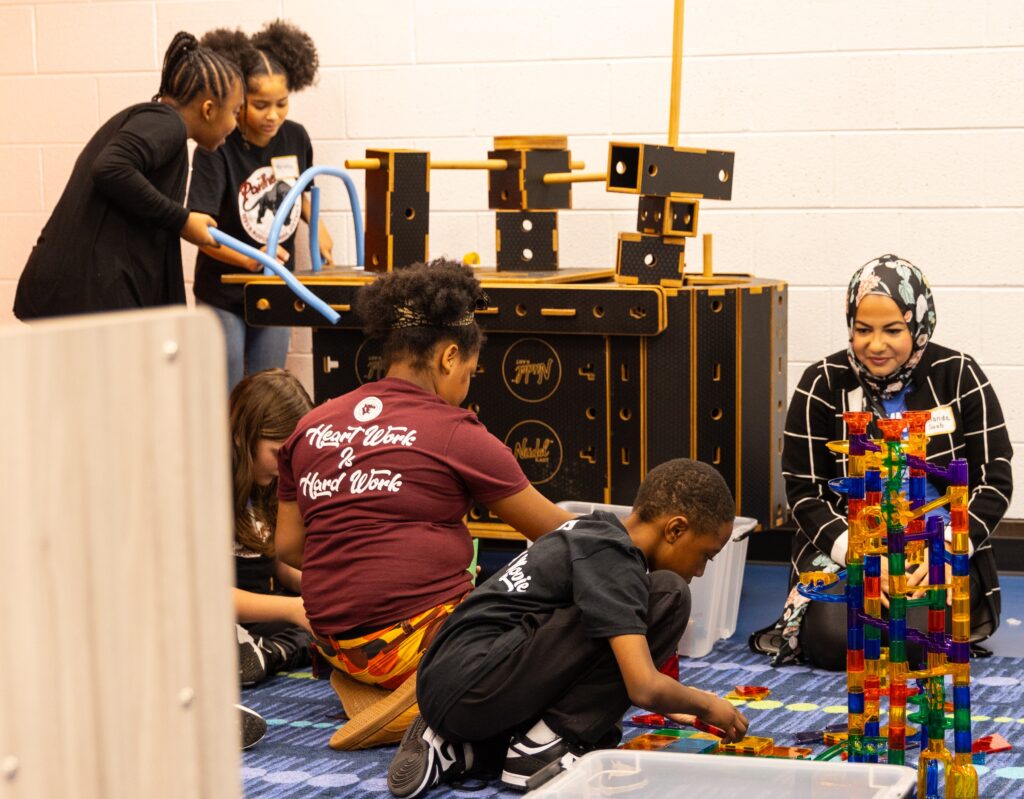
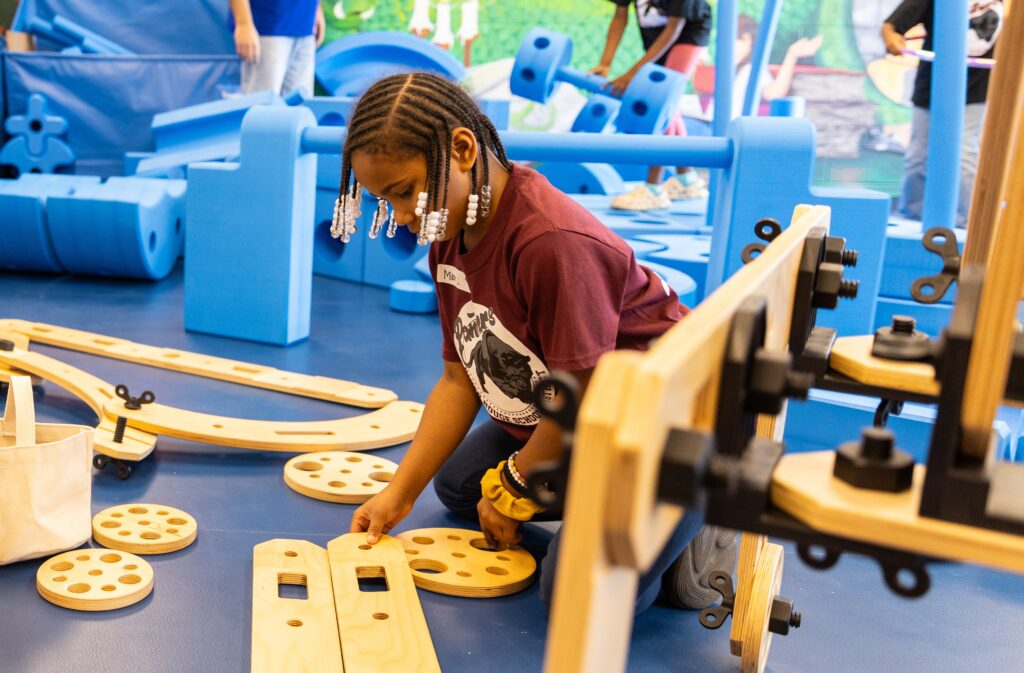
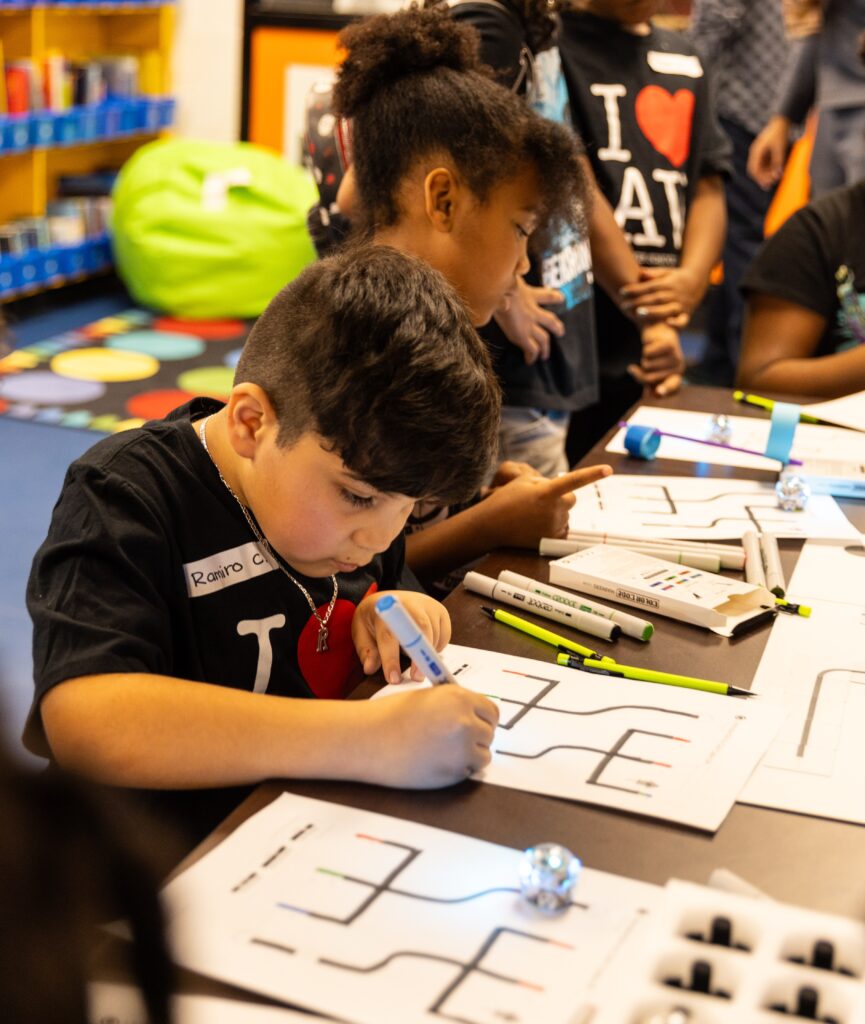
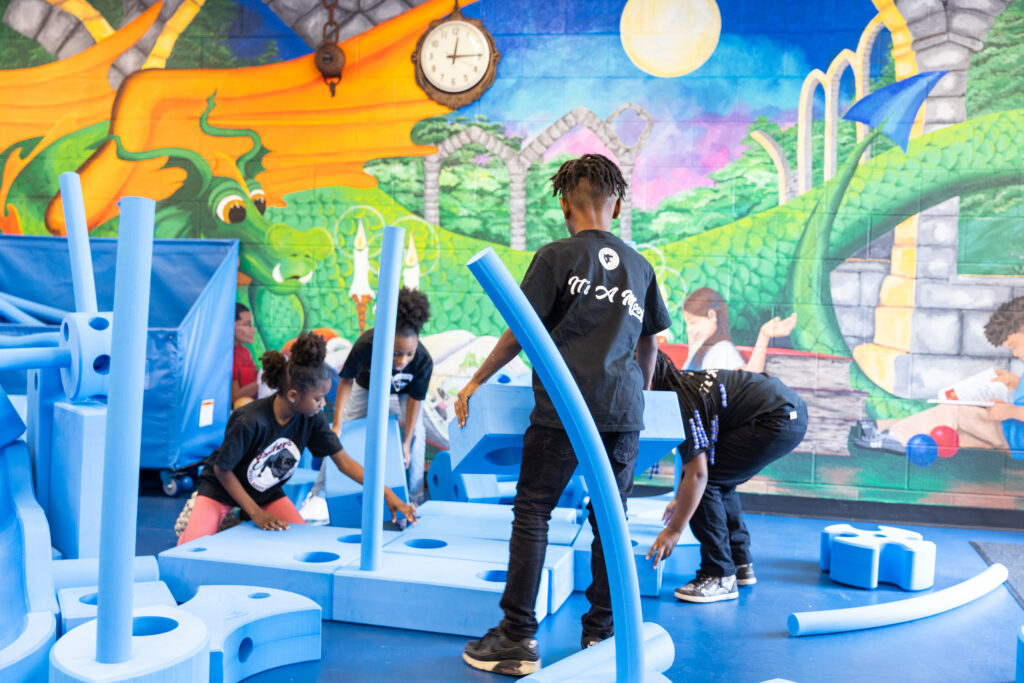
Ann Visger on Oct. 18th unveiled its own Innovation Lab, sponsored by Ernst & Young, to help bring out students’ STEM creativity. From magnetized marble runs and a Rig-ama-jig building kit to 19 iPads, the Ann Visger Innovation Lab offers a collective space for students and their families to have a fun, STEM-based learning experience.
“We hope that they will feel at home in this environment. Not only for the kids, but we invite their parents and community to come and enjoy the space,” said Sara Sanders, manager of Expanded Learning Time at United Way for Southeastern Michigan. “It’s beneficial for families because they will learn together, build together and understand better where each of them is coming from.”
HANDS-ON VOLUNTEERS FOR HANDS-ON STEM
If at any point one moment in this Innovation Lab can inspire them, it’s worth it.”
United Way is powered by people. No STEM space, nor event, would be possible without the hard work of countless corporate and community volunteers. The volunteers have created STEM spaces in under-used areas, mentored and guided students, and shown an outpouring of support for the development of young minds.
Julia Wang, a Comerica volunteer, explained that the hard work is all about inspiring kids.
“Knowing that if at any point one moment in this Innovation Lab can inspire them, it’s worth it,” Julia said. “Not just inspiration for careers, but even their mental health. I think that creativity, activity in the brain and exercising that muscle is good for their serotonin.”
While makerspaces encourage creativity, events like STEMpossible allow students unprecedented access to leaders who have found success in STEM.
“Our corporate partners came out in droves today; we had over 180 volunteers,” said Ellen Gilchrist, senior director of early childhood and education at United Way for Southeastern Michigan. “Together, we showed kids that STEM is fun, it presents opportunities, and it presents a chance to change the world.”
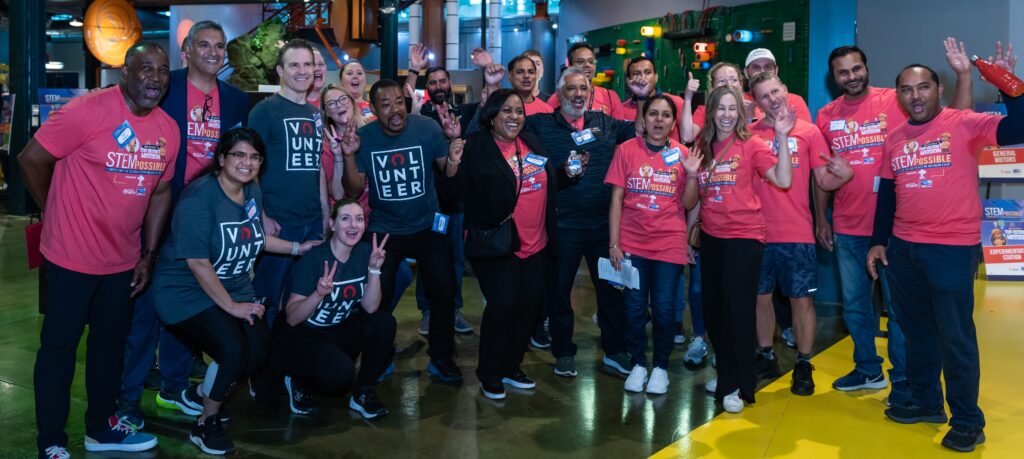
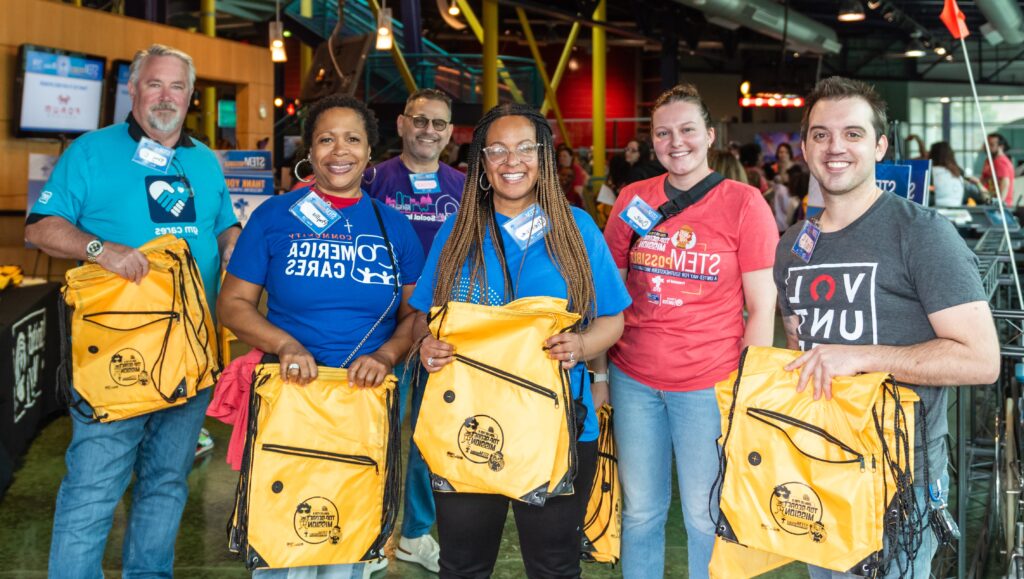
POWER OF PARTNERSHIP CONNECTS DETROITERS WITH TECH
Through partnerships between individuals, communities and private and public organizations, we obtain the power and resources to close the digital divide. Connect 313 is a collaborative organization founded by the City of Detroit, Rocket Companies, Microsoft and United Way for Southeastern Michigan, that aims to increase access to technology for Detroiters.
Connect 313 now leads the nation in Affordable Connectivity Plan signups for cities with a population over 150,000. The organization has distributed 75,000 devices and deployed 22 Tech Hubs across Detroit. The hubs are home to free devices and internet service for community members to use for job search and workforce development, telehealth needs and digital literacy training.
“Connect 313 has been acknowledged as a national model of what people-private-public partnerships can do being able to deploy thousands of devices to residents with diverse needs and lived experiences,” said Andre Ebon, senior director of diversity, equity and inclusion at United Way for Southeastern Michigan. “Whether they are returning citizens seeking employment, or senior citizens that need to access telehealth and online banking, or students who are on the precipice of discovering the possibilities of what they can do with technology.”
Inspired to bridge the digital divide?
Donate to Tech United: https://unitedwaysem.org/get-involved/give/tech-united-donation-page/.
Donate used technology to Human IT: https://www.human-i-t.org/professional-e-waste-services/.
Or volunteer through our portal: https://liveunitedsem.galaxydigital.com/.